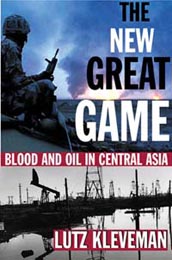Peak Oil Reading
Tired of reading blogs, low-quality forum discussions and mish-mash newspaper articles with not enough background checking? Still want to learn more about are current and worsening energy predicament?
With the risk of sounding like a cheap infomercial, here are The Energy Standard's picks for Peak Oil books you should consider.

The Last Oil Shock
David Strahan
John Murray, 2007
One of the latest and most
up-to-date books. A bit of
geopolitics, energy politics,
war on Iraq and geological
reality of oil peaking. ****
David Strahan
John Murray, 2007
One of the latest and most
up-to-date books. A bit of
geopolitics, energy politics,
war on Iraq and geological
reality of oil peaking. ****

Addicted to Oil
Ian Rutledge
I.B. Tauris, 2006
Really well researched
book written by a long
time energy economist.
Can be a bit heavy reading
at times, but for researching
the background this is
excellent stuff. ****
Ian Rutledge
I.B. Tauris, 2006
Really well researched
book written by a long
time energy economist.
Can be a bit heavy reading
at times, but for researching
the background this is
excellent stuff. ****

Energy Beyond Oil
Paul Mobbs
Matador, 2005
What is peak oil, what
it means, what is our
energy consumption,
what are our energy
sources. What are the
alternatives. How much
energy use can we cut.
Many issues covered and
very balanced. Good have
used a bit more editing. ***
Paul Mobbs
Matador, 2005
What is peak oil, what
it means, what is our
energy consumption,
what are our energy
sources. What are the
alternatives. How much
energy use can we cut.
Many issues covered and
very balanced. Good have
used a bit more editing. ***

Beyond Oil
Kenneth Deffeyes
Hill & Wang, 2006
Written by a retired oil geologist
who understands the oil reality.
Where are we now in production
(2005) and where are we going.
May be a bit repetitive for
those who read Deffeyes
earlier book, but still good
reading. ***
Kenneth Deffeyes
Hill & Wang, 2006
Written by a retired oil geologist
who understands the oil reality.
Where are we now in production
(2005) and where are we going.
May be a bit repetitive for
those who read Deffeyes
earlier book, but still good
reading. ***

Eating Fossil Fuels
Dale Allen Pfeiffer
New Society, 2006
What does oil have to do with food?
How does our agri-industry work?
What does it mean to be eating
fossil fuels? Can we do without
oil and natural gas? Will food
supply diminish? What are the
consequences? Many topics
are covered. Just wish the book
was a bit more longer and more
thorough. ***
Dale Allen Pfeiffer
New Society, 2006
What does oil have to do with food?
How does our agri-industry work?
What does it mean to be eating
fossil fuels? Can we do without
oil and natural gas? Will food
supply diminish? What are the
consequences? Many topics
are covered. Just wish the book
was a bit more longer and more
thorough. ***

The New Great Game
Lutz Kleveman
Grove Press, 2004
Sometimes reads more like a
detective story than investigative
journalism that it is. A good
round up of the situation in
the Stans (countries around
the Caspian sea). A primer for
the oil history and potential
future of the Caspian region.
Throws in some geopolitics. ****
Lutz Kleveman
Grove Press, 2004
Sometimes reads more like a
detective story than investigative
journalism that it is. A good
round up of the situation in
the Stans (countries around
the Caspian sea). A primer for
the oil history and potential
future of the Caspian region.
Throws in some geopolitics. ****

The Prize
Daniel Yergin
Free Press, 1993
The history of oil. Can be frustratingly
anglo/american myopic at times
at times, but nevertheless invaluable
in it's "bic picture" view about oil,
Middle-East, geopolitics and
the American predicament. ****
Daniel Yergin
Free Press, 1993
The history of oil. Can be frustratingly
anglo/american myopic at times
at times, but nevertheless invaluable
in it's "bic picture" view about oil,
Middle-East, geopolitics and
the American predicament. ****
Not recommended: End of Oil, Paul Roberts (in part sloppily researched, doesn't explain the system or infrastructure picture, misleading).

